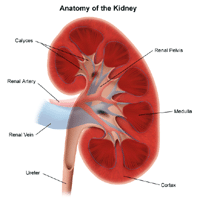Hemolytic Uremic Syndrome

What is HUS?
Hemolytic uremic syndrome or HUS is a rare condition that mainly affects children under the age of 10. It often causes:
-
Damage to the lining of blood vessel walls
-
Destruction of red blood cells
-
Kidney failure
What causes HUS?
Most cases of HUS occur after an infection in the digestive tract caused by the E. coli bacterium, O157:H7. Diarrhea and upper respiratory infections are the most common factors leading to HUS. This type of E. coli can be found in undercooked meat and is one of the causes of restaurant-related food poisoning outbreaks. HUS is less common in adults, but may occur more often in pregnant women, women who have been taking birth control pills, and women who have recently had a baby or have birth-related problems.
How might HUS progress?
The first stage of HUS often lasts from 1 to 15 days and may include gastrointestinal symptoms, such as:
-
Abdominal pain
-
Bloody diarrhea
-
Vomiting
Severe problems in the bowel and colon may develop in some cases. In these cases, even if the gastroenteritis has stopped, a child may still have these symptoms:
-
Irritability
-
Fatigue
-
Small, unexplained bruises or small, clot-sized hemorrhages visible in the mucosal lining of the mouth
-
Paleness
The child may produce little urine because damaged red blood cells and other factors may clog the tiny blood vessels in the kidneys or cause scars in the kidneys. This makes the kidneys work harder to remove wastes and extra fluid from the blood.
The body can't get rid of excess fluid and waste may, in turn, cause:
-
High blood pressure
-
Swelling of the hands and feet
-
Fluid buildup (edema)
The symptoms of HUS may look like other conditions or medical problems. See your doctor for diagnosis.
What does treatment for HUS commonly involve?
No known treatment can stop the progress of the syndrome once it has started. It is important for your doctor to tell the difference between this disease and a similar condition called thrombotic thrombocytopenic purpura, which does have a specific treatment.
Most treatments are aimed at easing the symptoms and signs of this disease and at preventing further complications. This may include:
-
Treatment of high blood pressure
-
Maintaining specific levels of fluids and salts
-
Blood transfusions
-
Kidney dialysis
-
Medicine
What is the prognosis for HUS?
Most children with HUS recover fully. A few, however, will have lasting kidney damage.



